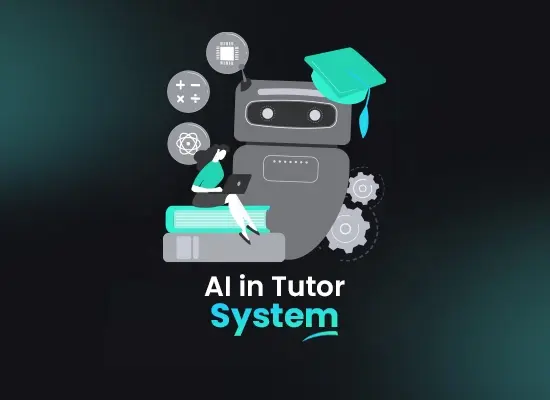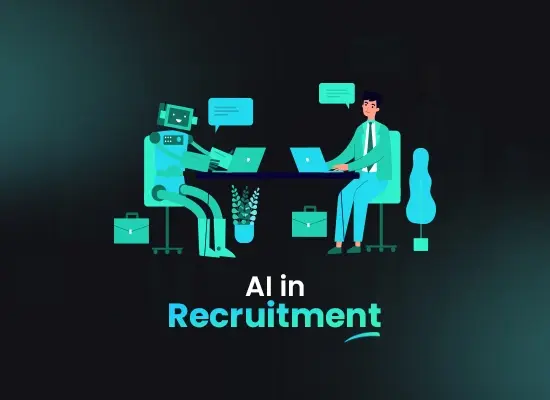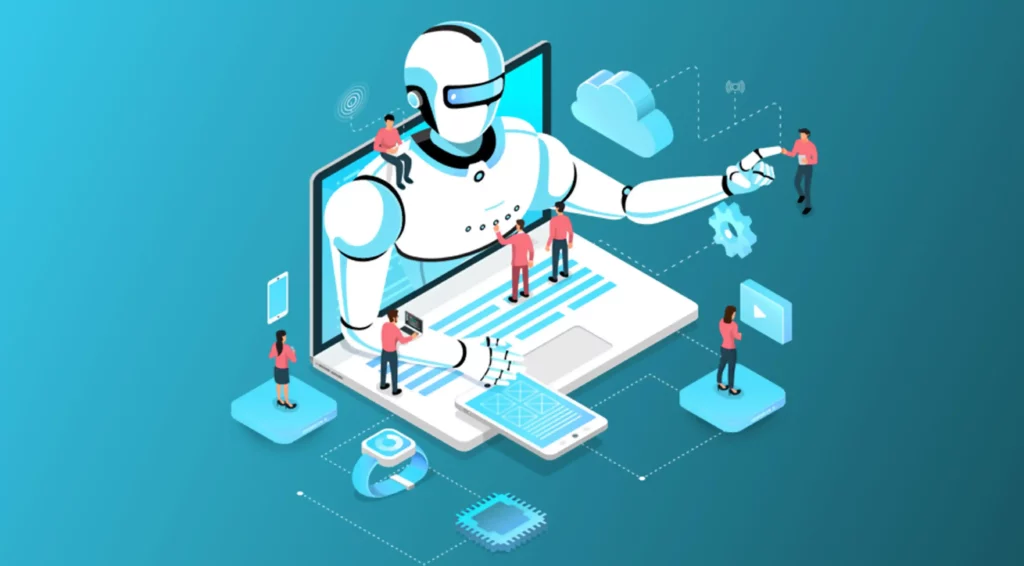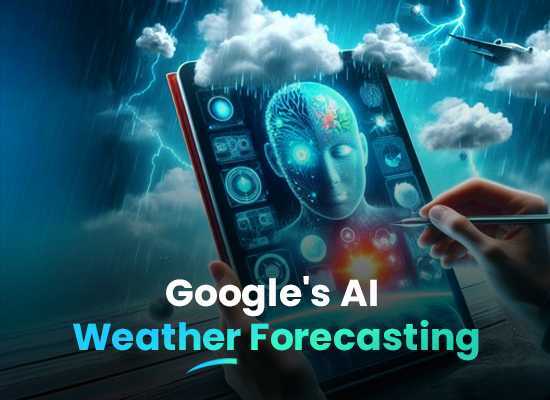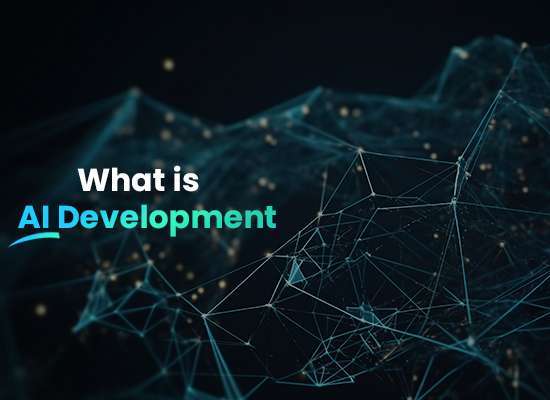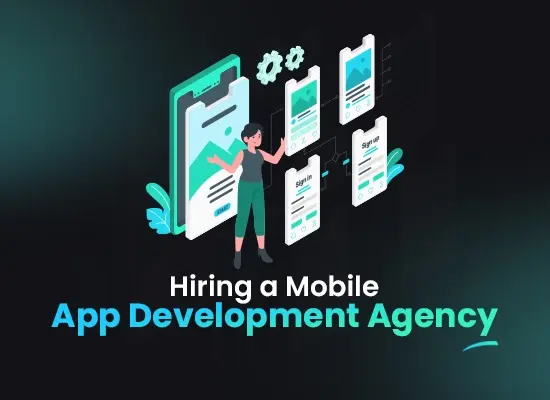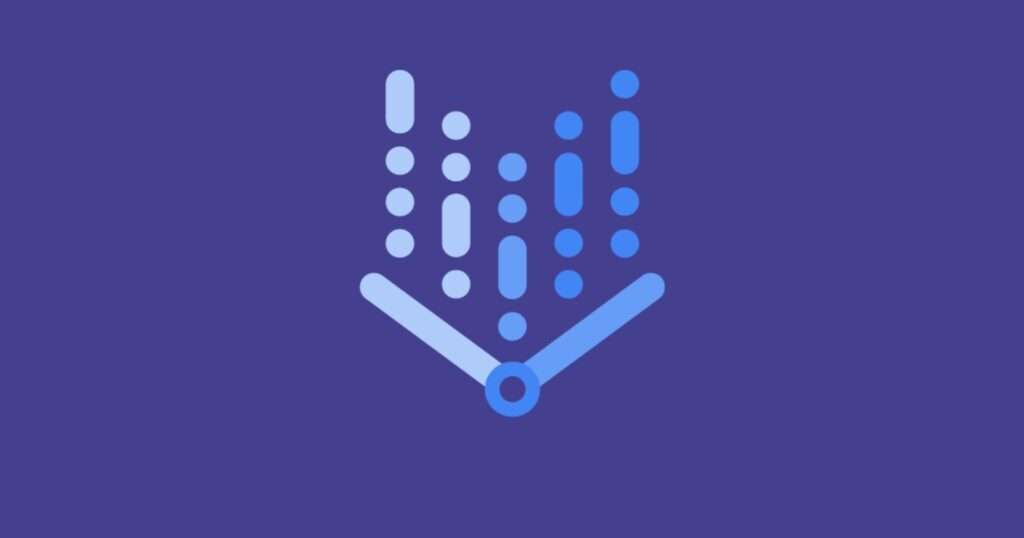AI in Sports and Wellness – It’s Not Just About Winning; It’s About Becoming Your Best
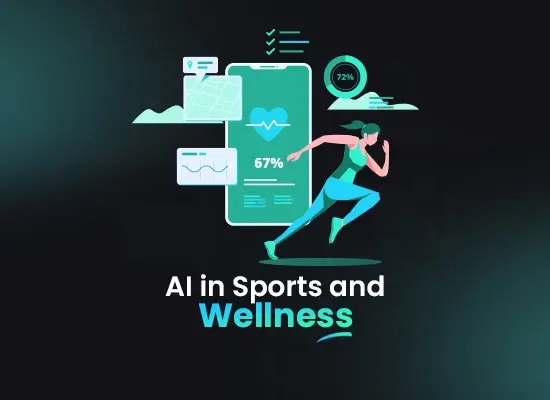
AI in Sports and Wellness:
AI in Sports and Wellness is the exciting fusion of cutting-edge technology and physical performance. Imagine sensors analysing your swing, wearables predicting injuries, and personalised training plans crafted by intelligent machines. From elite athletes to fitness enthusiasts, AI is revolutionising training, recovery, and overall well-being. It’s the future of pushing your limits, staying healthy, and achieving peak performance.
Factors that Affect an Athlete’s Fitness:
An athlete’s fitness hinges on a complex interplay of internal and external factors. While traditional methods focused on physical training and nutrition, data analytics is unlocking a deeper understanding of this dynamic. By analysing vast datasets encompassing artificially intelligent monitoring systems, performance metrics, and environmental influences, AI in sports is revealing hidden patterns and crucial insights.
Imagine an artificially intelligent coach, powered by sophisticated algorithms, that continuously learns from an athlete’s physiological data, training regimen, and even sleep patterns. This AI-powered companion can identify trends, predict fatigue, and suggest personalised adjustments to optimise training and minimise injury risk. This level of granular, artificially intelligent monitoring system is revolutionising sports conditioning and pushing the boundaries of human performance.
However, fitness isn’t solely physical. Mental well-being, emotional state, and even social media interactions play a significant role. Artificial intelligence in sports is delving into this psychological dimension, analysing sentiment in athlete communication and even facial expressions to identify potential stressors or mental fatigue. This proactive approach goes beyond physical monitoring, creating a holistic framework for athlete fitness supported by the power of AI and data engineering services.
As technology evolves, expect advancements like personalised nutrition plans driven by AI analysis of genetic predispositions and real-time biofeedback during training. The future of athlete fitness will be a symphony of cutting-edge AI tools working in concert with traditional methods, constantly learning and adapting to unlock an athlete’s full potential. This intricate dance of human capability and technological prowess promises to redefine the boundaries of human fitness in the exciting world of sports.
Seamless Collaboration | Cost-Efficient Solutions | Faster Time-to-Market

Evolution of Technology in Sports and Wellness:
From pixelated graphics on early video game consoles to cutting-edge AI, technology is redefining the landscape of sports and wellness. At the heart of this transformation lies AI in sports, weaving its magic across various aspects.
Artificially intelligent monitoring systems have undergone a paradigm shift. Imagine sensors embedded in wearables feeding data into AI and machine learning development, predicting injuries before they occur! This proactive approach, fueled by AI in sports analytics, empowers athletes to train smarter and coaches to optimize performance.
Artificially intelligent coaching is no longer a futuristic trope. AI-powered virtual coaches analyse individual performance, providing personalised feedback and tailored training plans in real-time. This democratises expert guidance, making it accessible to athletes of all levels, regardless of location.
But the impact extends beyond individual training. AI in sports analytics empowers teams with deep insights into opponent strategies, enabling coaches to develop data-driven game plans and make real-time tactical adjustments. Imagine instant suggestions for counter-strategies based on AI analysis of opponent formations!
The implications are vast. Injuries are reduced, performance is optimised, and the playing field is levelled. Technology’s evolution in sports and wellness, driven by AI in sports analytics, artificially intelligent coaching, and athlete monitoring, is not just enhancing performance, it’s creating a revolution in how we train, play, and stay healthy. This is just the beginning, and the future promises even more exciting possibilities as AI continues to evolve and permeate the world of sports and wellness.
Applications of AI in Sports Performance Enhancement:
The world of sports is undergoing a revolution fueled by artificial intelligence (AI). This exciting intersection, known as AI in sports, is transforming how athletes train, strategize, and perform, ultimately pushing the boundaries of human potential.
One pivotal area is AI in sports analytics. Imagine mountains of data – player movements, training metrics, competition patterns – all analysed by sophisticated AI algorithms. This unlocks unparalleled insights, revealing weaknesses, optimising training programmes, and even predicting injuries before they occur. Coaches turn into data-driven strategists, and athletes receive personalised, AI-powered guidance.
Virtual coaches take it a step further. These AI-powered systems analyse individual performance in real-time, providing instant feedback and corrective suggestions. Imagine an artificially intelligent coach analysing your tennis swing, pinpointing flaws, and guiding you towards perfect form. This personalised, 24/7 support accelerates learning and fine-tunes skills like never before.
Athlete monitoring, powered by AI, becomes incredibly sophisticated. Wearable sensors gather a symphony of data—heart rate, muscle activity, fatigue levels—all fed into AI algorithms. This real-time feedback empowers athletes to optimise training intensity, prevent overtraining, and even predict injuries before they strike. AI becomes a guardian angel, protecting athletes and maximising their performance potential.
AI in sports is not just about individual performance. It transforms team strategies, too. AI analyses past matches, predicts opponent moves, and suggests optimal plays in real-time. Imagine a football coach receiving AI-powered insights on the opponent’s defensive tendencies, allowing them to devise winning plays on the fly. This level of data-driven strategy gives teams a significant edge in the competitive arena.
The applications of AI in sports are vast and ever-evolving. From AI in sports analytics uncovering hidden potential to artificially intelligent coaches providing personalised guidance and artificially intelligent monitoring systems ensuring peak performance and injury prevention, AI is changing the game, propelling athletes and teams to new heights. This is just the beginning of an exciting journey where AI and sports join forces to rewrite the record books.
Data Analytics and AI: Revolutionising Sports Performance Analysis
The once siloed worlds of sports and wellness are converging, fueled by a powerful force: data analysis. This intersection is revolutionising both spheres, with AI in sports analytics taking centre stage. Imagine an artificially intelligent coach analysing your every move, artificially intelligent monitoring systems predicting injuries before they happen, and AI in sports optimising training regimes for peak performance—that’s the reality taking shape.
Data analysis helps uncover hidden patterns in the vast oceans of information generated by sensors, wearables, and performance metrics. AI in sports analytics empowers researchers and coaches to dissect plays, analyse player movement, and even predict opponent strategies. This intelligence, delivered in real-time, allows for instant adjustments and tactical tweaks, giving teams a decisive edge.
But the impact extends beyond the competitive arena. Athlete monitoring powered by AI is becoming a guardian angel, meticulously tracking physiological data to prevent injuries before they strike. Imagine sensors detecting fatigue or subtle changes in gait, triggering interventions that keep athletes healthy and thriving.
Artificially intelligent coaches are another exciting prospect. These AI-driven systems analyse your technique, provide personalised feedback, and adapt training plans based on your progress. Imagine having a tireless, expert mentor in your pocket.
Data annotation in sports and wellness is not just about numbers; it’s about unlocking human potential. With data analytics, artificially intelligent coaching, and athlete monitoring, we’re entering an era where data transforms performance, optimises recovery, and paves the way for a healthier, more fulfilling athletic journey. This is the future, and it’s powered by data.
Wearable Technology and AI in Athlete Monitoring:
Imagine a world where athletes wear tiny sensors that track their every move, feeding data into powerful AI engines. This isn’t science fiction; it’s the reality of wearable technology and AI in athlete monitoring. This dynamic duo is revolutionising sports by providing unparalleled insights into an athlete’s performance, health, and potential.
Data annotation takes the raw data collected by wearables—heart rate, muscle activity, sleep patterns—and turns it into actionable knowledge. Algorithms can identify fatigue before it sets in, predict injury risks, and even suggest personalised training routines. This athlete monitoring goes far beyond basic tracking; it acts as an artificially intelligent coach, whispering performance-boosting secrets in an athlete’s ear.
Imagine a runner training for a marathon. Her smart shoes track her stride, sending data to an AI that analyses her form and efficiency. The AI, acting as an artificially intelligent coach, suggests minor adjustments to conserve energy and optimise performance. This personalised feedback, powered by data analytics, could shave precious seconds off her race time.
The benefits extend beyond performance. Wearables and AI can monitor an athlete’s sleep quality, stress levels, and even emotional state. This athlete monitoring allows for proactive interventions that prevent burnout and promote overall well-being. Imagine a basketball player struggling with pre-game anxiety. Their wearable detects a spike in heart rate, prompting the AI to suggest calming techniques, optimising their mental state for peak performance.
The future of sports is intertwined with wearable technology and AI. This powerful combination is unlocking a new era of athlete monitoring, where personalised insights and virtual coaching lead to peak performance, reduced injuries, and happier, healthier athletes. So, the next time you see an athlete wearing a sleek device, remember, it’s not just a fashion statement; it’s a gateway to a world of possibilities powered by AI.
AI-Powered Coaching and Training Systems:
Imagine a world where every athlete has access to a personalised coach, analysing their every move, tailoring training plans, and predicting their potential. This isn’t science fiction; it’s the reality of AI-powered coaching and training systems. Leveraging the power of data analytics, these systems are revolutionising the way athletes train and compete.
At the heart of these systems lies the virtual coach, a digital mentor that analyses vast amounts of data from athlete monitoring tools like wearables and sensors. This data, encompassing everything from heart rate and muscle activation to movement patterns and technique, provides a holistic picture of the athlete’s performance.
The data analytics engine crunches this data, identifying strengths, weaknesses, and potential areas for improvement. This allows the virtual coach to create personalised training plans that are dynamically adjusted based on the athlete’s progress and changing needs. Imagine a coach who can analyse every stride of a runner, recommend the optimal training load to avoid injury, and even predict peak performance windows.
An artificially intelligent monitoring system becomes an integral part of this feedback loop. By tracking key metrics in real-time, the system can identify fatigue, prevent injuries, and optimise training intensity. Imagine a system that alerts a coach when a pitcher’s mechanics deviate, potentially preventing an arm injury before it occurs.
This is just the beginning of the AI-powered coaching and training revolution. As these systems evolve, they will become even more sophisticated, offering personalised insights, real-time feedback, and predictive analytics that will empower athletes to reach their full potential. The future of sports belongs to those who embrace the power of AI, and AI-powered coaching and training systems are here to stay.
Injury Prevention and Rehabilitation with AI:
The world of sports is constantly evolving, and technology is playing a pivotal role in pushing the boundaries of performance and safety. One of the most exciting advancements is the integration of data analytics, which is revolutionising the way we prevent and rehabilitate injuries.
Imagine a virtual coach that analyses your every move, identifying subtle imbalances and weaknesses that could lead to injury before you even feel a twinge. This is the power of an AI-powered, artificially intelligent monitoring system. Wearable sensors and cameras capture real-time data on your biomechanics, movement patterns, and even heart rate, feeding it into sophisticated algorithms. These algorithms, informed by vast datasets and historical trends, can predict potential injuries with remarkable accuracy.
But AI doesn’t stop at prediction. It actively helps prevent injuries. By analysing your movement patterns, AI in sports analytics can recommend personalised training adjustments and exercises to address specific weaknesses and improve your overall movement efficiency. This proactive approach can significantly reduce the risk of injuries, keeping you on the field and performing at your best.
Now, let’s say you do suffer an injury. The rehabilitation process can be long and tedious, but AI-powered virtual coaches are here to help. These intelligent systems can personalise your rehab programme, tailoring exercises and progression based on your individual recovery rate and goals. Imagine a virtual coach providing real-time feedback on your form, ensuring you perform exercises correctly and maximise your healing potential.
This is just the beginning of how AI is transforming injury prevention and rehabilitation in sports. As technology continues to evolve, we can expect even more personalised, data-driven approaches that empower athletes to train smarter, recover faster, and achieve their full potential. So, the next time you step onto the field, remember: AI is your silent guardian, analysing, predicting, and guiding you towards a healthier, more fulfilling athletic journey.
AI in Sports Broadcasting and Fan Engagement:
Imagine a world where AI in sports analytics transforms broadcasts with real-time, in-depth insights. Every play was dissected, all player’s strengths and weaknesses illuminated, all woven seamlessly into the narrative. This isn’t science fiction; it’s the present, and it is revolutionising fan engagement.
Beyond statistics, virtual coaches powered by AI are emerging. These digital mentors analyse athlete performance in real-time, providing personalised feedback and training adjustments. Imagine a quarterback receiving instant guidance on throwing mechanics during a crucial play, or a basketball player getting tailored shot selection advice. This personalised approach unlocks player potential and elevates the game.
But AI’s impact extends beyond the field. Artificially intelligent monitoring systems powered by AI keep players safe and optimise performance. Sensors track fatigue, movement patterns, and even emotional states, preventing injuries and ensuring peak performance. This data-driven approach fosters athlete well-being and pushes the boundaries of human potential.
The benefits extend to fans as well. Imagine watching a game with AI-powered personalised commentary that highlights your favourite players and showcases plays relevant to your interests. This tailored experience fosters deeper engagement and creates a more immersive viewing experience.
AI in sports broadcasting and fan engagement isn’t just about numbers; it’s about storytelling, personalisation, and optimisation. It’s about creating a richer, more meaningful experience for players, broadcasters, and fans alike. This is the future of sports, and it’s powered by AI.
Remember, this is just a starting point. You can expand on these ideas and add more specific examples to paint a clearer picture of the transformative power of AI in sports.
Virtual Reality (VR) and Augmented Reality (AR) in Sports and Wellness:
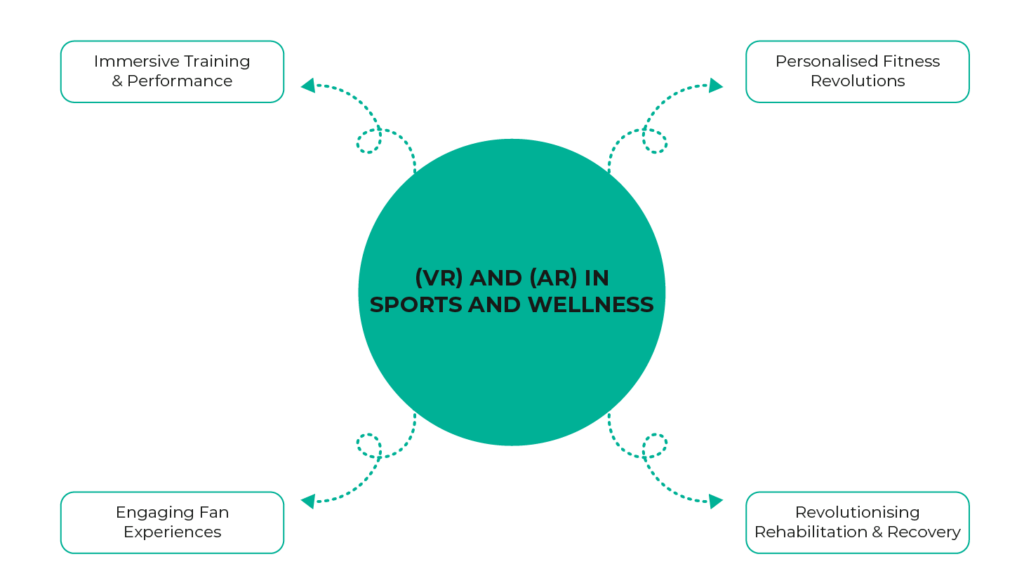
Immersive Training & Performance:
Athletes are stepping into virtual worlds powered by VR, simulating real-game scenarios with AI-powered opponents. This allows for an artificially intelligent monitoring system of performance, reaction times, and decision-making under pressure, all while receiving real-time feedback from a virtual coach. Imagine practising penalty kicks against AI goalkeepers replicating famous athletes’ styles or perfecting your golf swing on virtual courses designed by legends.
Personalised Fitness Revolutions:
AR overlays fitness routines onto your real world. See workout instructions displayed on your smart glasses as you perform, with AI analysing your form and suggesting adjustments in real-time. A virtual coach can guide you through personalised routines tailored to your goals and fitness levels, while athlete monitoring systems track your progress and adjust the difficulty accordingly. Imagine running through a virtual forest, dodging obstacles, and collecting power-ups, all while getting a personalised workout that pushes you to your limits.
Engaging Fan Experiences:
Imagine cheering for your favourite team from a virtual stadium, experiencing the roar of the crowd and the thrill of the game from the heart of the action. VR and AR are transforming fan engagement, offering immersive experiences with real-time data visualisations, replays, and even interactive challenges. Imagine analysing players’ performance with AI-powered sports analytics, predicting plays, and experiencing the game from different angles.
Revolutionising Rehabilitation & Recovery:
VR and AR are creating new pathways for rehabilitation and recovery. Imagine using VR to practice physical therapy exercises in engaging, interactive environments, while an artificially intelligent monitoring system tracks your progress and ensures proper technique. An artificially intelligent coach can provide personalised guidance and encouragement, making the process more enjoyable and effective.
This is just a glimpse into the exciting world of VR and AR in sports and wellness. With AI in sports analytics, an artificially intelligent coach, and an artificially intelligent monitoring system paving the way, the future promises a more personalised, engaging, and effective experience for athletes and fans alike.
Seamless Collaboration | Cost-Efficient Solutions | Faster Time-to-Market

Future Trends and Innovations in AI for Sports and Wellness:
AI in Sports Analytics:
Imagine a future where coaches have access to real-time insights generated by AI, analysing not just individual player performance but also team dynamics and opponent strategies. This is the power of data analytics. Advanced algorithms will devour mountains of data, from biometrics and game footage to social media interactions, to predict strengths, weaknesses, and even potential injuries. This deep understanding will revolutionise training regimens, improve decision-making on the fly, and ultimately elevate the competitive landscape.
Artificially intelligent coach in your pocket:
Forget expensive personal trainers or juggling multiple gym memberships. The future holds a personalized virtual coach powered by AI, right in your pocket. Imagine an app that analyses your fitness level, goals, and preferences, then crafts personalised workout plans that adapt to your progress. This artificially intelligent coach will use your biometrics collected through wearables and smart clothing, providing real-time feedback on form, intensity, and recovery. No more guesswork, just data-driven guidance towards your fitness aspirations.
Athlete Monitoring 24/7:
Gone are the days of reactive injury management. AI-powered, artificially intelligent monitoring systems will become the norm, proactively identifying potential issues before they sideline players. Wearables embedded with AI algorithms will analyse movement patterns, fatigue levels, and even stress markers, sending alerts to coaches and medical staff before injuries occur. This constant monitoring will optimise training routines, prevent burnout, and ensure peak performance throughout the season.
Conclusion:
These are just a glimpse into the exciting future where AI will transform both sports and wellness. Data analytics will empower coaches and players, while virtual coaching will democratise personalised fitness guidance. Athlete monitoring powered by AI will revolutionize injury prevention and ensure peak performance. The future is bright, and AI will play a pivotal role in pushing the boundaries of human potential in sports and wellness.

Author Bio
Syed Ali Hasan Shah, a content writer at Kodexo Labs with knowledge of data science, cloud computing, AI, machine learning, and cyber security. In an effort to increase awareness of AI’s potential, his engrossing and educational content clarifies technical challenges for a variety of audiences, especially business owners.
